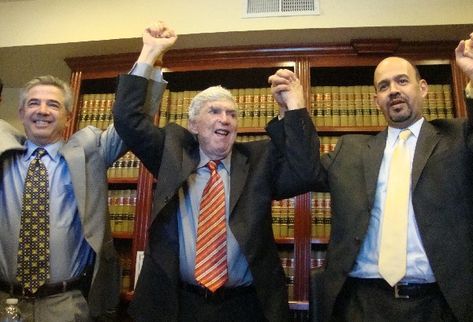As if the proverbial mediocrity of the usual television programming weren’t enough, in recent weeks there is a new series, incredibly badly made and edited even worse, that has been presented on the screen. “Cuba’s Reasons,” is the title of this latest garbage, which clearly intends to disinform the national population trying to create a state of negative opinion around the use of new information and communications technologies. To accomplish this they are using old methods that everyone knows don’t work: demonizing the dissidence as “mercenaries in the service of the empire,” presenting “hero” agents infiltrated into the heart of it, and showing “proofs” — which is never presented — of the activities designed to destabilize the revolution and betray the people.
The official demonization of the Internet in a country where people have a miserable level of access would seem an absurdity, which is reinforced if we consider that this campaign takes place in the era of computers and in the midst of a true global revolution in communications technology.
However, if we analyze the current global context and internal conditions in Cuba, the fact is perfectly logical. The Cuban government may be too late, archaic and decadent (as it is), but its attitude is consistent, given that its ultimate goal is to retain power at all costs.
I will try to present an explanation of what appears to be the desperate resort of the island’s government: disinformation as state policy.
New scenes and new actors
The year 2011 debuted with a new scenario. At the international level, the processes of transformations that are occurring in North Africa and that continue to widen their influence over neighboring regions, have demonstrated the functionality of the technology in support of democratic interests. Long-standing autocratic regimes have collapsed or are in the process of extinction faced with the push of innovative ideas that have flowed through social networks and have been able to mobilize crowds. A new world landscape is being drawn, which necessarily influences the emergence of new global and national politics. There are clear signs of the coming of other times, not yet clearly defined, but generally showing a trend: The era of dictatorships, as we know, seems to be coming to an end.
At the national level, the Cuban landscape has been gradually and quietly evolving in recent years. It would be useful to mention the fundamental elements that indicate these small apparent changes, or that have influenced them.
- A growing feeling of popular frustration faced with a permanent socioeconomic crisis that has translated into a general apathy: the regime has lost the power to call on people. Instead of the old voluntary and massive mobilizations, it’s becoming ever more obvious that participation in “revolutionary acts” is being achieved through the setting of “quotas” — for schools and workplaces — to achieve a significant volume of people to attend these public rituals.
- Official recognition of the inability to indefinitely maintain the so-called “subsidies” (social benefits), such as the ration book and others; as well as the announcement of the layoffs of 20% of the working population of the country. The government itself has confessed that “the model is broken.”
- The growing significance of the activism of civic groups since the imprisonment of the 75 independent journalists in 2003 (The Black Spring) in a wave of repression what received wide international condemnation and that led to the rise of the Ladies in White, an example of peaceful resistance, of the ability to act and of the force of ideas, even in a closed society.
- The events of the Havana Psychiatric Hospital that resulted in the death by cold and mistreatment of more than two dozen patients there, which led to a number of criticisms among the population and accented the lack of confidence in these institutions.
- The death after a long hunger strike of the prisoner of conscience Orlando Zapata Tamayo and the following hunger strike of Guillermo Fariñas, events that unleashed an international movement to reject the Cuban government. For the first time in many years, different sectors of the dissidence, without articulating a common program, showed unanimity in support of the release of the political prisoners.
- Growth in the sector of active dissidence, refreshed by the growth in activity by independent journalists and in the rise and rapid development of the independent blogosphere and social networks.
- The sudden and extemporaneous announcement of a Communist Party Congress, which was eight years late and held in secret, admitting only the base of Party militants.
- Forcing the release of the political prisoners of the Black Spring, an undeniable achievement of the forces of independent civil society, particularly of the Ladies in White and Guillermo Fariñas.
Other factors of a diverse nature have influenced the emergence of a scenario in which new social actors are breaking ground with alternative proposals to the national stalemate. An interesting variable in this scenario is, undoubtedly, the fact that a share of the recently released political prisoners have decided to remain in the country, and to continue their activities within the peaceful dissidence. This not only puts to rest the government’s argument that “dissidents are only interested in emigrating,” but shows the power of the widening focus of alternative views of civil society in virtually all regions of Cuba.
The government’s “reasons”
To try to understand the government’s new disinformation strategy, one has to start from the essential premise: it is a strategy of survival. The regime has run out of time in an irreversible way, and is incapable of recreating even its repressive methods. This puts it in an extremely fragile position, to the point that the mere use of technology as an alternative option to create and develop citizen journalism and social networks accelerates the crisis of a system that has been able to rely, until recently, on monolithic control of the media.
The closed nature of dictatorships is, paradoxically, their most vulnerable point, given that anything that alters the monolithic nature of the system can pierce its structure and precipitate its fall. So the Internet is now a crack through which what up to now has been half a century of totalitarian power could begin to drain away, forcing the authorities to implement an urgent campaign against “the free flow of information.”
As if the critical position of the regime was not already sufficiently compromised, the recent arrive of the fiber optic cable in the country — via Venezuela — will allow an exponential multiplying of the capacity to reach the network of networks. Thus, it is urgent for the Cuban government to create a social climate that justifies the maintenance of controls on the use of technologies, establishing a rigorous system of selection to determine who merits (revolutionaries-faithful-reliable) receiving this service and at the same time using this as an excuse not to allow general access.
Arguably, then, the series on Cuban TV — for which four programs have been produced to date — is only the phenomenal external expression of the creative weakness of the government, as well as a scandalous demonstration of its incapacity to renew its methods and discourse, forcing it to remain barricaded behind obsolete formulas proven to be ineffective.
It is obvious that there are objective reasons not only for the authorities to systematically obstruct access to the Internet, but to try to convince the masses of the great harm that flows from freedom of information. It is because of this that the entire information spectrum must pass through the purifying hand of the government and its most loyal servants who will determine the relevance — or not — of each news item before it is consumed by the population. To orchestrate this campaign — a medieval crusade against what has come to be called “cyberwar” — the authorities count on the media, in their absolute control, and the relative technological illiteracy and lack of access of the masses.
The effects of injustice
What the authorities obviously did not count on, is the effect on the population ideological fatigue, caused by the general decay of the system at all levels, which manifests itself for the most part in the total lack of impact of the programs already broadcast and in the result contrary to what they hoped to achieve. The ordinary Cuban tends to reject the informers, hence the antipathy aroused by the real or supposed “agents” who infiltrated the dissidence. On the other hand, the haste and the hatchet job of the makers of the series, flagrantly present a product so badly made that it offends the natural intelligence of ordinary people.
As a result of these questionable shows, some Cubans I know have more questions than answers, among them one finds with great frequency the following:
Who can believe the testimonies of the “agents” of State Security and some paper scrawled with numbers as proof of alleged payments to the “mercenary” dissidents?
How can they support the idea that the dissidents are seeking to benefit from the United States Interest Section if the TV series clearly shows that it was an alleged Cuban government agent with which the officials of the “enemy” county conducted their contacts with citizens of this country?
Is State Security working now to create more national mercenaries, or “counterrevolutionaries”?
Who is “fabricating” new villains, the Empire of the government of the Island?
And another rhetorical question which arises from an overwhelming logic: When an agent of the Cuban government lies on Radio Marti, is it the station that is lying?
The official media manipulation that occurs in “Cuba’s Reasons” is so obvious that people quickly incorporated it into the repertoire of jokes that characterizes the Cuban people. “Did you see the third season of Castro’s espionage soap opera?” asks one friend to another. And there is no shortage of newspaper vendors who use the show to encourage a sale: “Hey! The agent in Granma!” a proclamation that at the same time expresses a covert irony: the real “agent” is the official press.
However, beyond the ill-fated attempt to “stuff” viewers, the price of this staging is expensive in other equally counterproductive ways, because fabricating imaginary enemies from the screen also has promoted the activism of dissidents, which is gaining recognition. In a country where the media is in the hands of the ruling class it could be argued that facts do not exist until they are reported by the media. If we add to this the increasing loss of credibility for that class and the social need of finding new spaces of expression — as developed in the sustained growth of the alternative niches of civil society — it could be argued that disinformation as a new government policy is doomed to defeat.
Now we must wait for the new episodes already being advertised on Cuban television. Surely in some of the chapters to come they will try to keep the promise, so often postponed, of showing us the actual payments of imperial emoluments on the part of the greatly debased home-grown mercenaries, be it a leader of the opposition, an independent journalist or a blogger.
They will need more than the reliable testimony of their own paid agents and, of course, they will have to completely renovate the production team for the series to see if they can give us a more finished product. Still, it won’t do to create too many expectation, the genre of suspense requires, in principle, a range of possible finales that the Cuban government is unable to offer. It turns out that the end of this process — a few chapters more or less — is already known by nearly everyone. In short, the ideological architects of the amendment to the Constitution were right in 2002 when they decided that socialism in Cuba is irreversible: it’s true; precisely in the static nature of its sentence.
April 18 2011


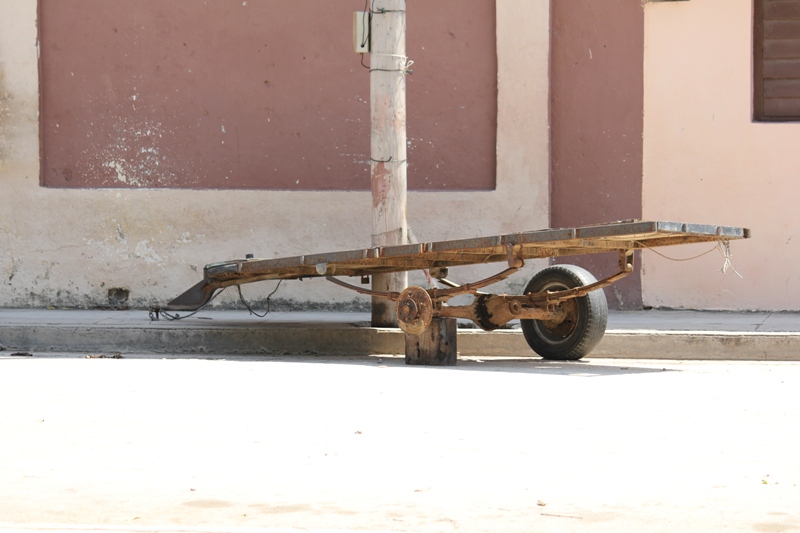
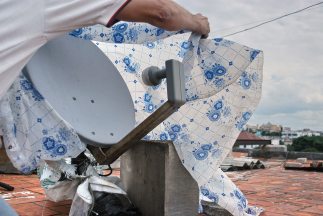 Migdalia and Ramon can’t watch the afternoon sopa opera since the State inspectors confiscated the antenna in the middle of February.
Migdalia and Ramon can’t watch the afternoon sopa opera since the State inspectors confiscated the antenna in the middle of February.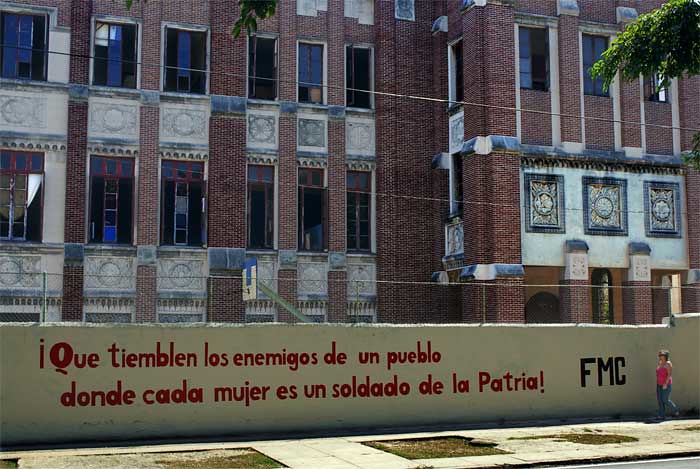
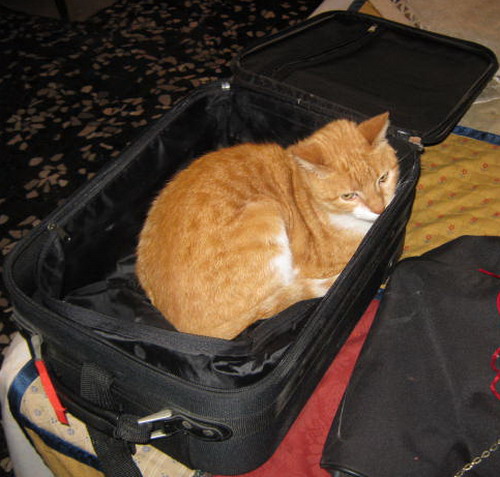


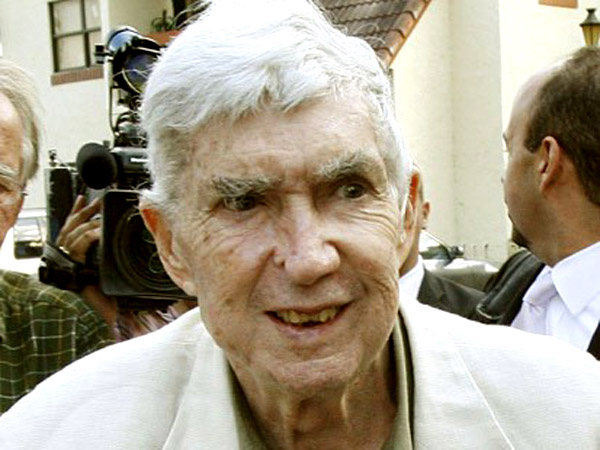 There is a question I’ve formulated on more than on occasion, and that I have recently revived. It goes more or less like this: “If I, who detests with every particle of my being the North Korean dynasty, for example, suddenly gathered my intentions and provoked an attack that killed dozens of North Korean civilians, would this effort be enough to call myself, from now on and proudly, an anti-Kim fighter?”
There is a question I’ve formulated on more than on occasion, and that I have recently revived. It goes more or less like this: “If I, who detests with every particle of my being the North Korean dynasty, for example, suddenly gathered my intentions and provoked an attack that killed dozens of North Korean civilians, would this effort be enough to call myself, from now on and proudly, an anti-Kim fighter?”